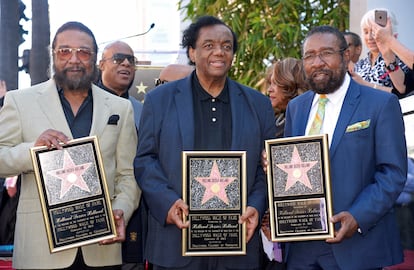From left to right, Eddie Holland, Lamont Dozier and Brian Holland pose with their stars on the Hollywood Walk of Fame, which they received in 2015. Phil McCarten (REUTERS)
On Monday the 8th, Lamont Dozier died in Arizona at the age of 81.
I'm afraid only black music scholars will be able to identify him: they know he was one-third of Holland-Dozier-Holland, the songwriting-producing team that fueled the rise of Motown Records, one of the rare record labels named after a style of music.
More information
A Motown after Motown
The Motown sound represented the branch of
rhythm and blues
that aspired to a certain sophistication.
The fact that it was made in Detroit (the motor city of its name) already suggested its multiracial ambition, its penchant for universality, its professionalism.
The cliché insists that Motown functioned like the assembly lines of the automobile industry, but reality lowers the metaphor.
Motown could aspire to imitate the methods of Fordism, but in reality it was a clan family, where the will of the founder, Berry Gordy, was law.
There was no barrier between private life and work.
Gordy himself had a plethora of children with different women when he began a clandestine relationship with Diana Ross, lead singer of the Supremes, who became the main target of Motown Records.
Conversely, Gordy commanded the musical direction of Marvin Gaye, after he married his sister, Anna Gordy.
As part of the family, and subject to his discipline, Berry decided to make him the black version of Frank Sinatra, despite the evidence that he was another kind of artist.
Birthdays and other family celebrations used to end in brawls.
And it is that Berry had the last word in the selection of the recordings that Motown would promote (frequently, the songs with the greatest potential were performed by various artists, being chosen - what a coincidence - the recordings of those who had the best relationship with the boss) .
It was not a mere matter of caprice or nepotism.
Berry wanted to keep the talent he had hired at bay.
The Holland-Dozier-Holland case had complications.
They had been singers and that made them very effective at putting together different voices: the Four Tops, the Elgins, the Isley Brothers, the Marvelettes, Martha and the Vandellas and the aforementioned Supremes benefited from their psychology to find the emotional tone in their songs.
So it's true: Motown's monumental impact in the 1960s was due in large part to Holland-Dozier-Holland.
Veterans of the music industry, they wanted some kind of recognition: for example, a label to publish their productions.
It was not so strange: the label already had several subsidiary labels.
But Gordy clipped their wings: no ego massage.
It was then that Holland-Dozier-Holland played their most lethal card outside the Motown umbrella, creating two of their own labels in 1968.
Gordy claimed that they were under contract exclusively to Motown.
Oh yeah?
The trio signed under a pseudonym the songs they published on Invictus and Hot Wax, with artists such as Freda Payne, Honeycone or the Chaimen of the Board.
Nobody was fooled: the new productions sounded very similar to those that had been released at Motown.
That became one of those legal labyrinths that feed battalions of lawyers.
Many years later, I asked Elmore Leonard, master of the Detroit crime novel and music lover, how he hadn't set any of his plots in or around Motown.
He lowered the volume of his voice: “I have a wife and children;
I wouldn't have been compensated."
Lamont Dozier was the first to jump ship and record under his name.
He had a great success with a vindication of African-American culture,
Going Back to My Roots
, at once a conscientious song and a filler, with the degree of authenticity guaranteed by the South African Hugh Masekela.
In the 1980s, Dozier settled in the UK and benefited from the British adoration for all things Motown.
He wrote hits for Alison Moyet, Phil Collins, Eric Clapton, Simply Red. In all, he recorded a dozen solo albums on his own, but his career never took off.
As Berry Gordy, his old enemy with whom he later reconciled, put it, "When you get millions of dollars for songs you wrote in the '60s, you lack an incentive to succeed."
Can be.
50% off
Subscribe to continue reading
read without limits
Keep reading
I'm already a subscriber









